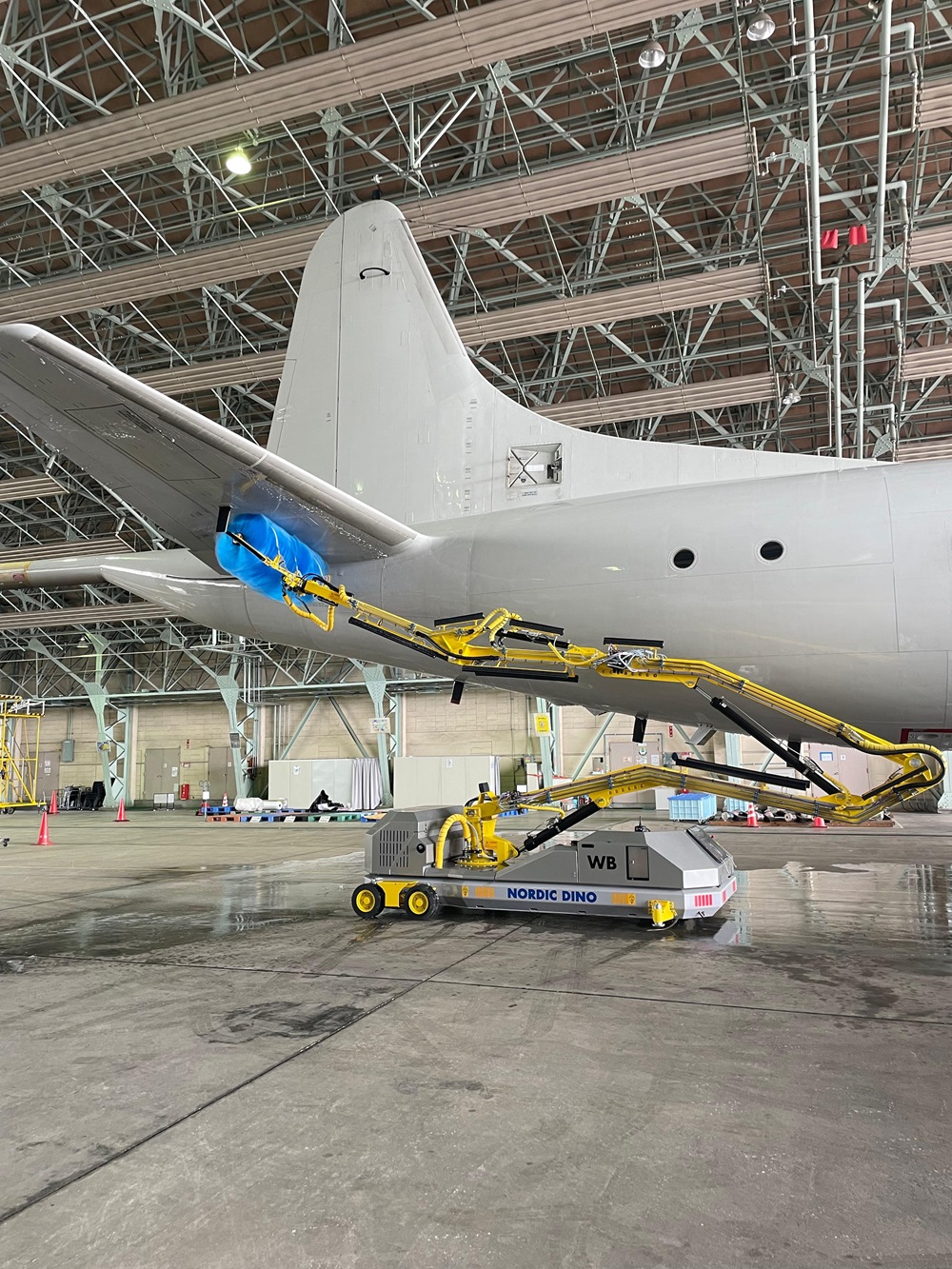Nordic Dino, the world’s leading aircraft washing solutions and a subsidiary of Avia Solutions Group, has updated customer reported data of its robotic washing system’s performance to find that total water savings could likely reach 4,000 litre per wash. The update to estimated water savings is the most recent development in the company’s 41-year history of aircraft cleaning technology development, directly corelating to financial savings, as well as untold environmental benefits from water conservation. The savings are attributed to the washing system’s adherent efficiency, specifically designed for airframe cleaning.
The new 4,000 litre figure comes from a survey of Nordic Dino’s automated cleaning robots’ operators, upgrading a previously reported estimation of 1,800 liters. The operators surveyed also indicated increased variation in water usage for traditional cleaning methods. Previous indications of water usage for manual washing were as high as 11,300 litres, with the most recent survey data indicating a range between 6,000-10,000 litre water usage per manual washing method.
“This water savings offers material and financial benefit to our robots’ operators, “Veronika Andrianovaite, Chief Commercial Officer (CCO) of Nordic Dino Robotics AB, said. “I am happy this data points to numerous downstream benefits of increased efficiency for MROs, airlines, and ground handling companies.”
According to data gathered by the International Benchmarking Network for Water and Sanitation (IBNET), a World Bank affiliated group, the 4,000 litre water savings from use of the Nordic Dino’s cleaning robot would translate into approximately €150 Euros per day – or € 25 Euro’s per-wash in water savings alone. This water savings is in addition to reductions in workers and time needed per task. This figure comes from the groups tracking of water pricing in European cities in 2021, when prices for 1,000 litre of water ranged from €5.51 Euros per cubic meter in Oslo, Norway and €3.33 in Germany.
“Our robot’s design enables companies to progress to the future with environmental consciousness and stewardship,” Andrianovaite said. “It’s crucial for our design to make sustainability easier and more lucrative.”
The robot’s design saves water through its cleaning process, as artificial intelligence applies water and detergent directly to the cleaning surfaces, preventing water loss from spilling and dripping. Artificial intelligence has an aptitude for conservation by only applying water directly where it is needed. The automated cleaning platform’s precision targeting of water and detergent, as the robot is equipped with two varying levels of detergent for areas that require more attention.
The cost of water in Europe and the savings from automated washing systems is intrinsically linked to environmental protection and issues of sustainability. In March of 2023, the European Environment Agency said that changes in water price as regulatory policy were among the first and most effective ways to provide sustainable water management.
“The endorsement of the idea that price increases can lead to reduction in use for environmental benefit is combined with downstream benefits of reduced usage; including reduction in wastewater, and energy required to transport water in the first place,” Andrianovaite said. “Water savings with our robot will likely continue to rise, due to airline preference in aircraft type.”
While narrowbody jets continue to maintain dominance in both Boeing and Airbus orderbooks, both manufacturers also reported preferences for larger category of aircraft. For example, of the A320 family aircraft, orders placed in 2023 indicated that the larger A321 outperformed the smaller A320 by 86%. This news follows developments from the manufacturer that indicated an exploration into restarting production of the A380 superjumbo.
As the surface area that needs cleaning grows with aircraft type, and with an increased importance on environmental stewardship, operator’s savings have increased. Beyond the benefit to everyday business operations with the robot’s automation, the survey of customers indicated that there was a monetary value to sustainability initiatives.
Nordic Dino Robotics is part of the Avia Solutions Group family, the world’s largest ACMI (Aircraft, Crew, Maintenance, and Insurance) provider, with a fleet of 214 aircraft, and a parent company of SmartLynx, Avion Express, BBN Airlines Indonesia, KlasJet, Magma Aviation and more.
